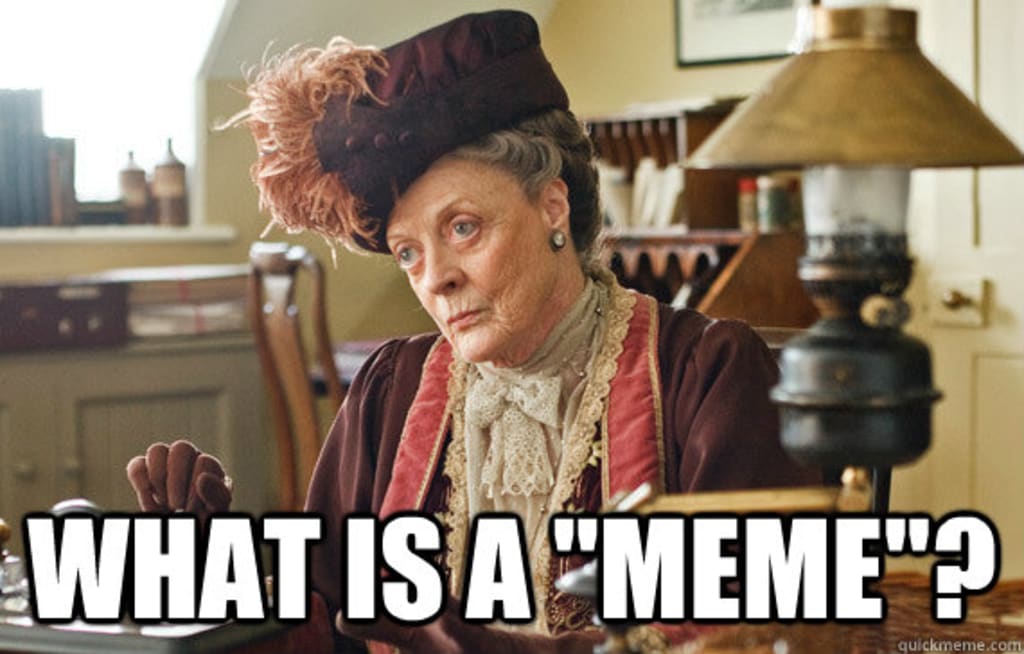Article 42: The Meme-Ing of Life
Where did the internet meme come from, and how on earth did it get so popular?

The other day, I was on the receiving end of a question that shocked me to my very core.
“What is a meme?”
I was quick to scoff, briefly guffawing, before repeatedly failing to give an exact definition.
So I went back to the drawing board, and when that was fruitless, consulted Wikipedia, and here is the result…
The origins of the internet Meme.
—————————
The recent success of the Marvel Cinematic Universe has proven that every truly great hero deserves an equally great origin story. So, here are the not-so-humble beginnings of the internet meme.
Memes are everywhere. The likes of Bad Luck Brian, Pepe the Frog, and an explanatory Sean Bean, regularly dominate our social media scrolling. Not even ex-presidents are immune from this global phenomenon, with Barack Obama recently wishing his former vice president, Joe Biden, a happy birthday through the medium of meme.
Yet, what is a meme? Where did it come from? And why on earth are they so popular?
–
The word meme was created by evolutionary biologist and author Richard Dawkins in his 1976 book, The Selfish Gene. It is a compound of the English word "gene," and the Greek word "mimēma," which translates as “that which is imitated.” Dawkins used the term to discuss the spread of ideas and culture within evolution.
From this, the internet meme was born. In 2013, Dawkins himself spoke on this matter, describing the internet meme as one that has been deliberately altered through human interaction, rather than experiencing a number of random mutations, thus exhibiting a form of Darwinian selection.
So, now we’ve got that cleared up, it’s time to find out how the internet meme achieved its current levels of success and popularity.
For answers, there was only one place to look: Facebook, the habitual home of the internet meme. A quick post on the social media giant quickly drew a number of interesting responses.
Jonathan Parsonage, 22, a student at Bristol University said, “They’re the ultimate means of reflecting the 21st century.”
Meanwhile, Georgie Harwood, 19-year-old student from Dorset, stated that, “They are so relatable.”
As they say, "right in the feels." A scientific study has recently located "the feels" somewhere between the left femur and Montserrat.
In essence, the connotations of the two quotes are identical. The internet meme imitates the activities of its audience, providing a millisecond of mass-produced observational comedy; a captioned image demonstrating a cultural practice or idea of the time.
Whilst they are often subject to sensationalism, with hyperbolic tendencies employed for humorous purposes, they maintain their success through a symbiotic relationship with the dominant cultural hegemony of their target market. Popular hegemonic ideas and themes provide material for the internet meme, which, in turn, spreads and shares this culture with the world. They’re not subtle. Most social media outlets offer you the chance to "tag" a friend, and, in some cases (naming no names, Facebook), there’s even a button labelled "share."
So, the internet meme marches on. The self-sustained conservation tool of culture continues to fire ideas to viral status at an alarming rate, with no shortage of ammunition. For every new political, sporting, or celebrity event, there’s a million memes in the making, and by the time the next morning comes, they’re already making themselves at home on phone screens worldwide.
However, as with so many great heroes, the meme must choose whether its powers should be used for good or evil. Despite the fact that some internet memes have a detrimental societal impact, spreading negative prejudices, racism, and sexism, the majority have maintained a surrealist innocence.
Chloe Givans, 21, a student at Portsmouth University, put her love of memes down to the fact that, “They make me LOL and LMAO.”
Irregardless of the shameless abuse of acronyms, there is a point here. A point which bears an uncanny resemblance to a scene-setting superhero’s opening speech (gruff voices at the ready).
In a world where headlines are dominated by atrocities, inequalities, and conflict, there is one who can bring giggles to the masses. One who can make you chortle on the bus and share this guiltless joy with a phrase like "this is so us" or "this was you on Saturday night." This hero is the meme. It’s not the hero the internet deserves, but it’s the one it needs right now.
About the Creator
Harry Bullmore
21-year-old, leggy blonde Journalism student, looking for no strings attached reading flings.






Comments
There are no comments for this story
Be the first to respond and start the conversation.